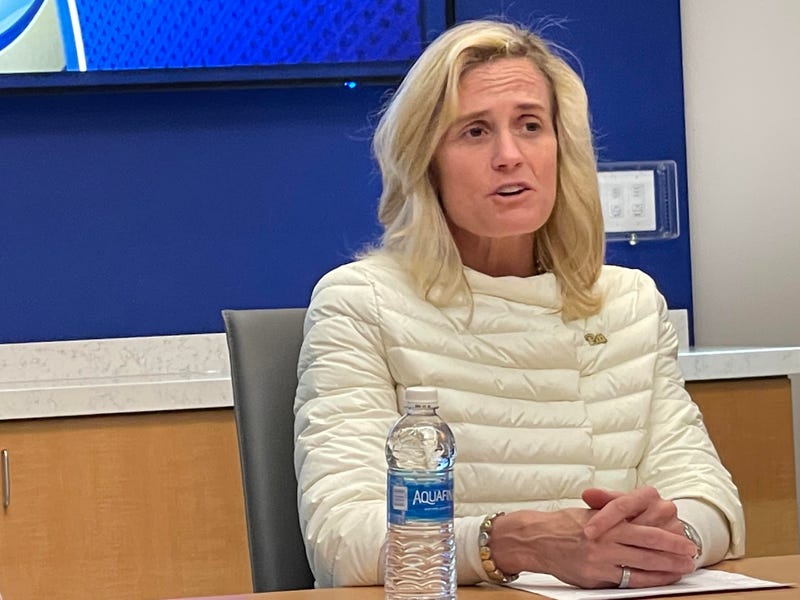
PITTSBURGH (93.7 The Fan) – Pitt has tasks forces. Pitt has a collective which helps fund student-athletes NIL money. Where Pitt really tries to distance itself from others is more personal than financial.
NIL is a tough situation for schools and coaches. It’s a system with 50 different laws regulating the use of money for Name Image Likeness, as the states rule what is correct. Pennsylvania is changing its laws slightly in January to allow the University of Pittsburgh to have more involvement in arranging deals, but it’s not total control.
The only way to bring it under control at this point has nothing to do with the NCAA. It would take a federal law to change the current NIL. There have been proposals in the Senate and the House, but nothing really with any traction. As Pitt Director of Athletics Heather Lyke points out, do you think the federal government wants to run college athletics?
“Ideally, there is some more structure designed around it,” Lyke said. “It’s literally free agency and there are no limits. There is no documentation that is shared among everybody. We document internally in our office. I think it’s important to have disclosure. I think it’s important and help guide our student-athletes when they get approached on certain situations. That’s how we manage it, but that’s not necessarily consistent across the country.”
“What you hear. What you see. What you read. Who is to say what has happened or transpired? No one really knows. I think that makes it challenging. I have empathy for all coaches right now, it’s a very challenging time.”
As it works right now the Pitt athletic department does not invest in NIL. They are affiliated with Alliance 412 created by Panthers alumnus Chris Bickell. The money for that program comes from donors and while they communicate, Alliance 412 is a separate group. They work at times together to help athletes find endorsement opportunities. That doesn’t mean future or current student-athletes can’t work out their own deals. There is no reporting on that. Unless disclosed, no one knows the true finances involved in any deal.
What if a student-athlete comes to a school, even in part, because of a separately brokered NIL deal. They enroll at the university, begin their careers and then that outside arrangement is broken or altered. It wouldn’t be the school’s responsibility to correct a transaction they didn’t consummate. The student-athlete is screwed, upset and now another university, or maybe even just a fan of another university, promises a deal if they transfer?
“It’s a part of college athletics today,” Lyke said. “I think the biggest thing I struggle with is the tampering aspect. It doesn’t reflect incredibly well on our profession.”
In order to try and control these types of scenarios, Lyke says it goes back to building a rapport between the players and the coaches.
“When student-athletes have real, genuine relationships with their coaches as I think a great majority of our kids do,” Lyke said. “They will go to a coach and say ‘look, I’m being offered something by another school. What can we do at Pitt?’”
Lyke believes because of the quality of coaches and what they teach them about these situations, they have these conversations. They aren’t taboo. They deal with it head on.
That all sounds great, but in order to have honest conversations, they have to be able to have the resources to match another offer or at least to stay competitive. It’s why Alliance 412 was established.
So, does Lyke, and other Pitt athletic department staffers, tell donors they are moving their money to that fund? How does that work?
She says when you have those relationships not just between athletes and coaches, but between the athletic department and donors you can find out where they want to give. Where they want their money going.
“We will always align our donors’ interests with what they want to give to,” Lyke said. “You are not going to convince people to give to the collective if they want to give to something else. You build a relationship. You understand what they are interested in.”
“The Collective is important. It’s a competitive advantage and we’ve got to be competitive. You’ve got to get in that game.”
“It is a bit of the Wild West in that sense. We are doing the best we can to manage it. We are grateful for the support we have in our collective to manage it.”
Lyke said the university appreciates all understanding as they navigate through something no one had experience with as little as five years ago. She is also an advocate for changing this current system.
“The current model is not sustainable,” Lyke said. “I think we got to have a better solution as leaders in college athletics.”
What is that solution?
It’s complicated. It involves national measures and schools and donors being accountable. It could involve student-athletes and universities agreeing to limits or caps. Like Major League Baseball teams and players benefitting from an unequal system, what is the incentive for change for those profiting or succeeding in this current setup?
It’s the Wild West and it’s not going to be settled soon.
